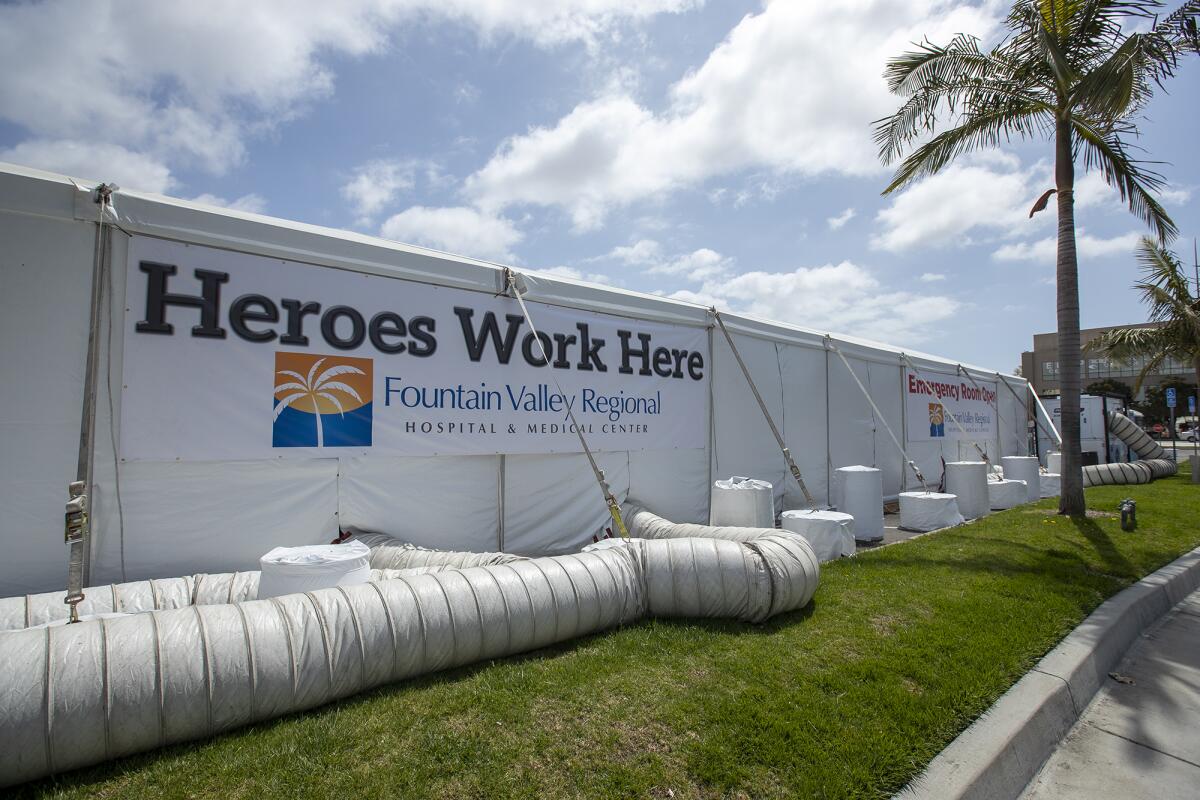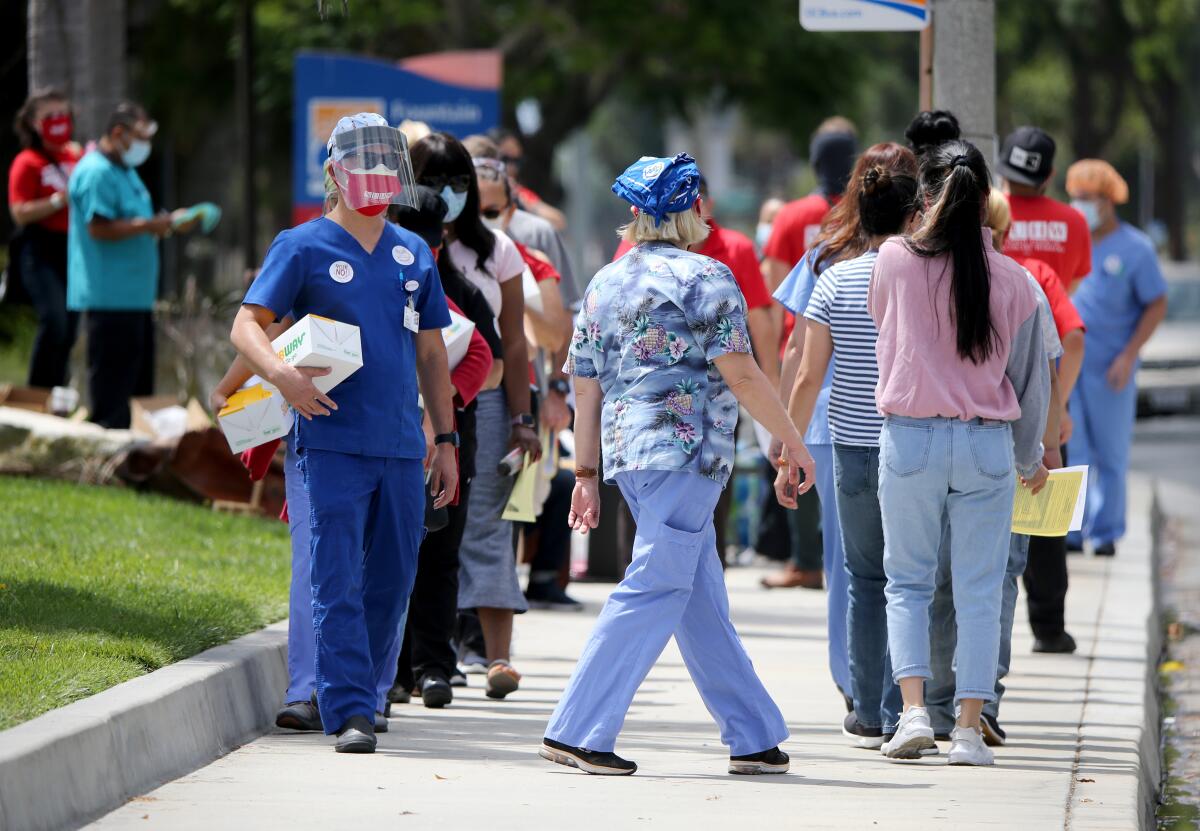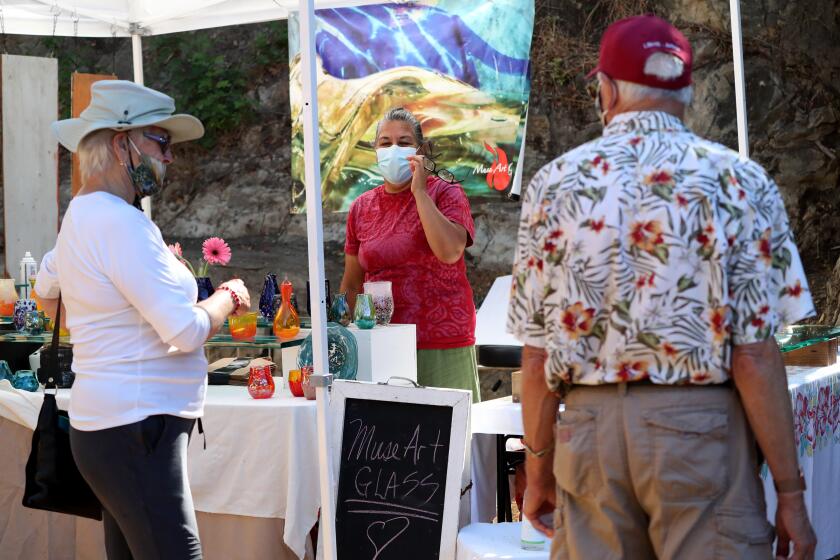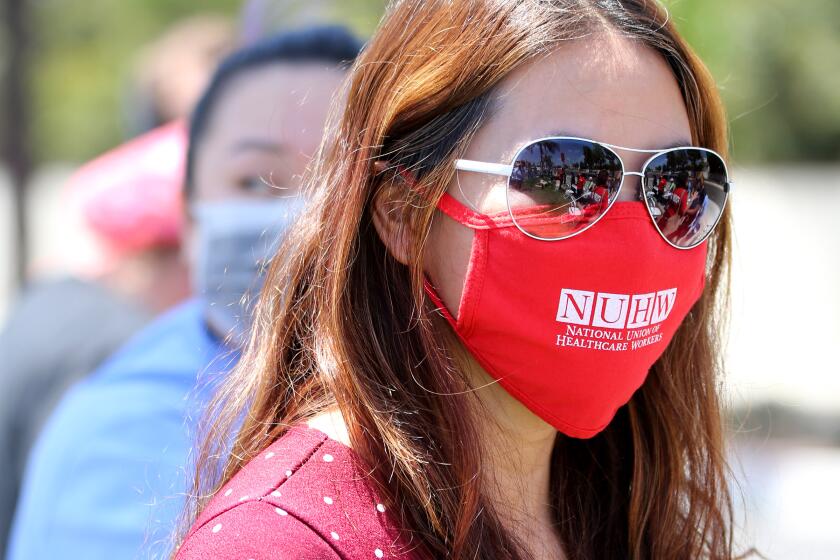State health officials cite Fountain Valley Regional Hospital for ‘systemic’ COVID-19 failures

State health officials have determined Fountain Valley Regional Hospital put caregivers and patients at risk by scattering COVID-19 patients throughout the facility and assigning staff to treat infected and uninfected patients — validating employee concerns brought forth when the pandemic began.
Officers with the California Department of Public Health described in a 33-page report “systemic” infection control violations observed by surveyors during multiple site visits conducted in July. The visits were triggered by a July 1 complaint filed by the National Union of Healthcare Workers on behalf of more than 700 employees of the facility, who claimed administrators weren’t doing enough to protect patients and staff.
The report, filed with the U.S. Department of Health and Human Services’ Centers for Medicare and Medicaid Services, reached a similar conclusion.
“The [governing body] failed to ensure an effective, active hospital-wide infection control program for the prevention, control and investigation of infections and communicable diseases, including COVID-19,” it stated. “The cumulative effect of these systemic practices resulted in the failure of the hospital’s [governing body] to ensure the provision of quality healthcare in a safe manner.”

Surveyors found multiple examples of COVID-19 patients being housed in rooms next to uninfected patients, even in the facility’s pediatrics and oncology units, the latter of which contained immunocompromised individuals.
They also noted the hospital’s failure to cohort infected patients together in isolation and provide a dedicated team of employees who would serve only in the isolated units.
The Orange County Health Care Agency on Friday reported 22 new deaths and 282 new cases related to the coronavirus.
During a July 17 site visit, when the hospital’s intensive care unit was filled with COVID-19 patients, surveyors found a total of 48 infected individuals and two patients whose status was still being determined were being housed in eight different units, often in rooms near patients without the virus.
Investigators also observed inadequate handwashing among physicians, at least one unmasked patient having blood drawn and used gowns not being placed in the proper receptacles.
“These failures created the risk of cross-contamination and spread of infection,” the report concluded.
Barbara Lewis, the NUHW Southern California hospital division director who helped draft the July 1 complaint, said union representatives received the report on Sept 15.
“We believe our members’ concerns were validated by this report,” Lewis said Wednesday. “We’d met with the hospital starting the end of March into mid-May and had been raising all of these concerns — there was no responsiveness.”
The process required hospital officials to prepare and present a plan of correction describing actions that would be taken to address the numerous findings identified during the survey, which concluded July 22.
Todd Burke, a spokesman for hospital owner Tenet Healthcare, confirmed Thursday the plan had been completed and accepted by the Centers for Medicare and Medicaid Services.
“A follow-up survey was conducted this week, and we await the results to validate the actions outlined in our plan of correction,” Burke said by email. “Fountain Valley Regional Medical Center takes patient safety very seriously and is committed to continuous improvement in quality measures and safety procedures.”
Following the visits, Fountain Valley Regional opened a COVID-19 unit isolated from the rest of the patient population and staffed by employees who treat only infected individuals. Lewis said NUHW will work to ensure directives outlined in the hospital’s correction plan are followed.
“I’m 100% confident our members are going to continue to be on this, documenting and raising any issues and focusing on it,” she said.
Employees — many who turned out to protest conditions in two rallies this summer — say while many positive changes have been made, a lot remains to be done, especially in the area of testing.
State surveyors are investigating the Fountain Valley hospital after a union complaint alleged administrators have failed to develop and implement effective infection control procedures at the the 293-bed facility.
The hospital currently advises employees with symptoms to self-quarantine and seek testing at one of Orange County’s available testing sites. But employees want more testing.
Mila Pham, a secretary who works in the hospital’s COVID-19 unit and cares for her aging mother, said frontline workers are afraid of being exposed to the virus at work and bringing it home.
“We might be carriers, but we don’t know if we have it or not because we’re not tested,” she said. “We get tested for [tuberculosis] every year — why not COVID-19?”
Lewis said union representatives are currently pressing state lawmakers to consider a testing regimen that would call for all newly admitted and readmitted patients to be tested for COVID-19 upon arrival.
The plan also calls for baseline testing of all healthcare workers, in addition to testing 25% of a facility’s staff each week on a rotating basis as well as all symptomatic and potentially exposed employees.
“The testing is still a big issue with our members, especially as we enter the flu season,” Lewis said. “it’s going to be very important to test everyone.”
All the latest on Orange County from Orange County.
Get our free TimesOC newsletter.
You may occasionally receive promotional content from the Daily Pilot.






